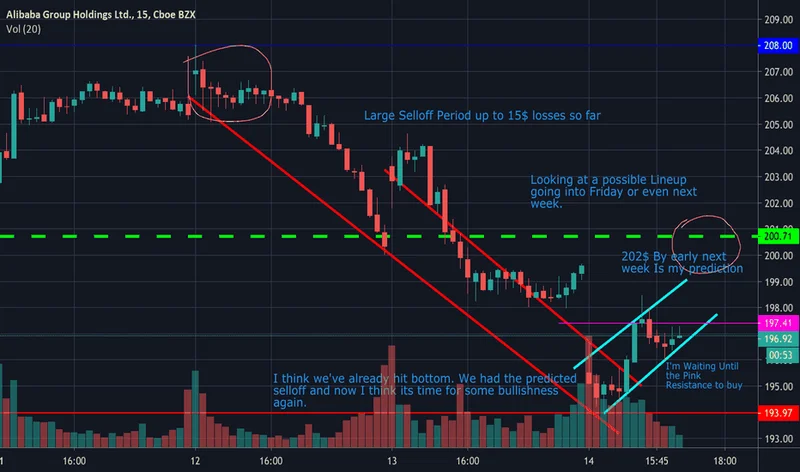Alibaba Stock Plunge: White House Concerns vs. Investor Sentiment
The AI Analyst vs. Wall Street: Who *Really* Understands Alibaba's Future?
Here's the thing about AI: it's not just about crunching numbers, it's about seeing patterns, spotting the subtle shifts that humans might miss in the whirlwind of market noise. And right now, an AI analyst at TipRanks is whispering something that Wall Street seems to be ignoring about Alibaba (BABA): proceed with caution.
We're talking about Rina Curatex, powered by OpenAI-4o, downgrading Alibaba stock to "Neutral" and trimming the price target to $176, despite the stock's impressive 84% climb this year. Wall Street, in contrast, is still singing a bullish tune, predicting a 24% upside. So, who's right? Is this a case of AI being overly cautious, or is it a glimpse into a future that the traditional analysts are overlooking? You can read more about the downgrade in this article: AI Analyst Downgrades Alibaba Stock (BABA) to Hold and Trims Price Target Despite Wall Street Optimism.
The AI's Cold Calculation: A Dose of Reality?
The AI's analysis isn't dismissing Alibaba's strengths. The AI acknowledges the solid momentum in AI and cloud services, a 26% year-over-year climb in cloud sales to 33.4 billion yuan, and strategic partnerships like the one with SAP. But it's also flashing some serious warning signs. Weak free cash flow due to high spending, ongoing losses in the quick-commerce business, and rising debt – these are the factors weighing on the AI's assessment. It's like seeing a beautiful, powerful engine in a car, but also noticing the oil leaks and the worn tires.
What I find particularly fascinating is the AI's ability to weigh these factors holistically. It’s not just about the exciting growth in AI; it’s about the cost of that growth, the sustainability of the business model. This is the kind of nuanced analysis that I think can get lost in the hype cycle.

Of course, Alibaba is pushing back against other recent negative reports. A Financial Times report, citing a White House memo, alleged that Alibaba provided tech support to the Chinese military, including access to customer data and AI services. Alibaba has vehemently denied these allegations, calling them false and malicious. The stock dipped on the news, proving how sensitive the market is to anything that could jeopardize Alibaba's standing with US regulators. But the narrative of the US-China tech relationship is one that can't be ignored, and it's a key factor in the long-term viability of the stock.
This divergence between the AI's assessment and Wall Street's optimism raises a critical question: are human analysts too swayed by the potential upside, blinded by the allure of growth, while the AI remains laser-focused on the underlying financial health? Is the AI a better judge of risk? And is there something to be said for its ability to detach from the emotional rollercoaster of the market? I think the answer to all of these is yes.
The AI's concerns about free cash flow and rising debt are particularly relevant in today's economic climate. With interest rates still relatively high, companies with weak balance sheets are going to face increasing pressure. Alibaba's quick-commerce business, while promising, is also a money pit, and the AI is right to question its long-term viability. All of this is to say that the AI's downgrade isn't just a knee-jerk reaction; it's a data-driven assessment of the risks that Alibaba faces.
What does all this mean for you, the investor? Well, it's a reminder that even in the age of AI, there's no substitute for critical thinking. Don't just blindly follow the herd. Take a look at the AI's analysis, weigh the risks and rewards, and make your own informed decision. And don’t forget to ask yourself, what data points are you using to make your decision?
The Future Demands Clear-Eyed Optimism
Alibaba's story is far from over. The company has the potential to be a global leader in AI and e-commerce. But potential doesn't guarantee success. Success requires a solid financial foundation, a clear strategic vision, and a willingness to adapt to changing market conditions. The AI's downgrade is a wake-up call, a reminder that even the most promising companies can stumble if they don't manage their risks effectively. It's a challenge to Alibaba to prove that it can deliver on its potential while maintaining financial discipline. And it's an opportunity for investors to make smarter, more informed decisions.
